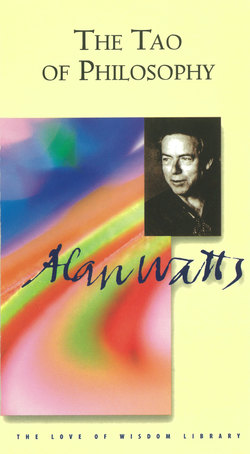Читать книгу Tao of Philosophy - Alan Watts - Страница 8
На сайте Литреса книга снята с продажи.
ОглавлениеIntroduction
Welcome to The Tao of Philosophy, and to some remarkable ideas about the role of philosophical inquiry and the “true purpose” of living. These thoughts spring from a life-long study of Eastern philosophy by an inspired and articulate Westerner, Alan Watts. A prolific writer and speaker, Watts is well known for his numerous books on Christianity, Zen, Hinduism, and Taoism, including his classic The Way of Zen. Originally from England, Watts was the Chaplain at Northwestern University during the time of World War II. Following the publication of Behold the Spirit in 1947, Watts left the Church in 1950, and soon thereafter traveled to California to teach at the Academy for Asian Studies in San Francisco with Dr. Fredrick Spiegelberg.
Three years later Watts began the “Way Beyond the West” radio series on KPFA in Berkeley. His radio talks were so well received in the Bay Area that they continued on KPFA for thirty years. At various times the shows also aired on other Pacifica stations in Los Angeles, New York, and Boston on Sunday mornings, and became popularly known as “the hangover cure” in the late sixties and early seventies. During this period the Los Angeles Times reviewed his books and described Watts as “perhaps the foremost Western interpreter of Eastern thought.” He spoke regularly at colleges, seminar centers, and progressive churches across the country. The Sunday radio programs were by that time recorded in the field instead of at the studios of KPFA, and his early radio style of presentation gave way to a dynamic speaking style that earned him a reputation as a modern philosopher/entertainer. Alan Watts passed away in 1973 in the midst of writing a companion volume to The Way of Zen on Taoism.
Recently, when I began to select original live recordings to re-introduce radio audiences to my father’s spoken works, many of his later talks with generally Taoist themes stood out as excellent examples of his mature philosophy. It was apparent that he felt comfortable with a view of the world which is “of itself so,” and not the construct of a personified ultimate reality. The wisdom of working with the course and current of nature to solve the problems of ecological balance also appealed to his sensibilities, and he spoke of the “organism/environment” as “more nearly us than I.”
The Tao of Philosophy is a literary adaptation of talks selected to introduce the new “Love of Wisdom” series to today’s audiences. The following chapters provide rich examples of the way in which the philosophy of the Tao is as contemporary today as it was when it flourished in China thousands of years ago. Perhaps most significantly, these selections offer modern society a clearer understanding of what it will take for a successful reintegration of humans in nature.
We begin with a foreword written in July of 1953, entitled “On Philosophical Synthesis.” The contrast between the style of this earlier article and the following chapters reveals the transformation Watts underwent as he moved from the academic environment, in which these questions were first raised, to the personal experience, in which they were resolved. For as his close friend, poet Elsa Gidlow, wrote of his growing into the spirit of the Tao:
... it transformed him as he allowed it to permeate his being, so that the reserved, somewhat uptight young Englishman, living overmuch in his head, in his mature years became an outgoing, spontaneously playful, joyous world sage. He believed that a widespread absorption of the profound wisdom of Taoism could similarly transform the West.
—Mark Watts
1995, San Anselmo, California
